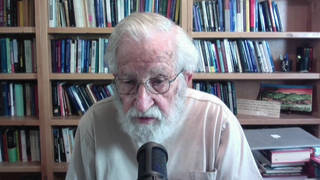
By Amy Goodman and Denis Moynihan
Mass movements make history. They don’t follow a prescribed trajectory. They aren’t predictable. Bernie Sanders’ bid for the Democratic presidential nomination is a case in point. On Wednesday, Sanders suspended his campaign, making former Vice President Joe Biden the presumptive nominee. “While this campaign is coming to an end, our movement is not,” Sanders said. Expressions of disappointment flooded the internet as millions of his supporters heard the news. “Our hearts are heavy,” Aracely Jimenez of the climate justice Sunrise Movement said in a statement. “In Bernie Sanders, we had a presidential candidate whose visionary solutions — ‘Medicare for All,’ the Green New Deal, paid sick leave — are exactly the policies we need to get out of the crises we’re living through now.”
The progressive movements arrayed against President Donald Trump and all he represents now find themselves in the blistering crucible of the COVID-19 pandemic and its consequent economic recession, if not outright depression. Traditional organizing — rallies, door knocking, face-to-face meetings — are essentially shut down. Ingenuity and resilience will be needed to prevail in the coming months.
Bernie Sanders understands the long haul. In August 1963, at age 21, he was arrested protesting school segregation in Chicago. Four months earlier, on Good Friday, Martin Luther King Jr. was arrested for the 13th time, protesting segregation in Birmingham, Alabama. There, he wrote his “Letter from a Birmingham Jail,” responding to eight white Alabama clergymen who labeled him an “outsider” and criticized his tactics. “We recognize the natural impatience of people who feel that their hopes are slow in being realized,” the clergymen wrote. “But we are convinced that these demonstrations are unwise and untimely.”
King replied, in his famous letter (using the racial lexicon of the time), “For years now I have heard the word ‘Wait!’ It rings in the ear of every Negro with piercing familiarity. This ‘Wait’ has almost always meant ‘Never’… ‘justice too long delayed is justice denied.’”
In his campaign suspension announcement, Bernie Sanders said, “Dr. Martin Luther King Jr. reminded us that ‘the arc of the moral universe is long, but it bends toward justice.’ The fight for justice is what our campaign has been about. The fight for justice is what our movement remains about.”
Rep. Alexandria Ocasio-Cortez, perhaps the most prominent, and youngest, of the progressive activists elected to Congress in 2018, endorsed Sanders early in his campaign. Now they are working together to shape federal pandemic response legislation. “One of the key things that we must push for, we must fight for… are very strong concessions and accommodations made for a progressive future,” she said this week on the Democracy Now! news hour.
Ocasio-Cortez is outraged by the racial disparity among pandemic victims. “COVID deaths are disproportionately spiking in Black + Brown communities,” she tweeted on Friday. “Why? Because the chronic toll of redlining, environmental racism, wealth gap, etc. ARE underlying health conditions. Inequality is a comorbidity. COVID relief should be drafted with a lens of reparations.”
The statistics backing up her tweet are grim: In Louisiana, African Americans comprise 32% of the population, but 70% of the COVID-19-related deaths. In Michigan and Illinois, African Americans make up 14% to 15% of the population, and 41% of the COVID-19 deaths. Racial disparities are also evident in COVID-19 deaths New York City, the epicenter of the pandemic in the United States. The actual number of deaths will likely never be known, as people, often the undocumented and those in the margins of society, are dying at home, uncounted.
“We should have universal systems where every person can see the doctor free of charge when they need to, so that they can get the care that they need. That is what it means to live in an advanced and modern and humane society,” Ocasio-Cortez added on Democracy Now! “As long as we don’t do that, we have not earned the right to call ourselves one.”
Noam Chomsky, world renowned linguist, author and dissident, is 91 years old–the same age Martin Luther King Jr. would be had he not been assassinated on April 4, 1968, and lived to today. “It’s common to say now that the Sanders campaign failed. I think that’s a mistake,” Chomsky said on Democracy Now! this week. “It was an extraordinary success. It completely shifted the arena of debate and discussion. He was able to inspire popular movements … and turn them into an activist movement, which doesn’t just show up every couple of years to push a lever and then go home, but applies constant pressure, constant activism.”
Surviving this pandemic will require global solidarity, discipline and compassion. Grassroots social movements aren’t deferring to the Biden campaign or the Democratic Party. Like Martin Luther King Jr., they refuse to wait.











Media Options